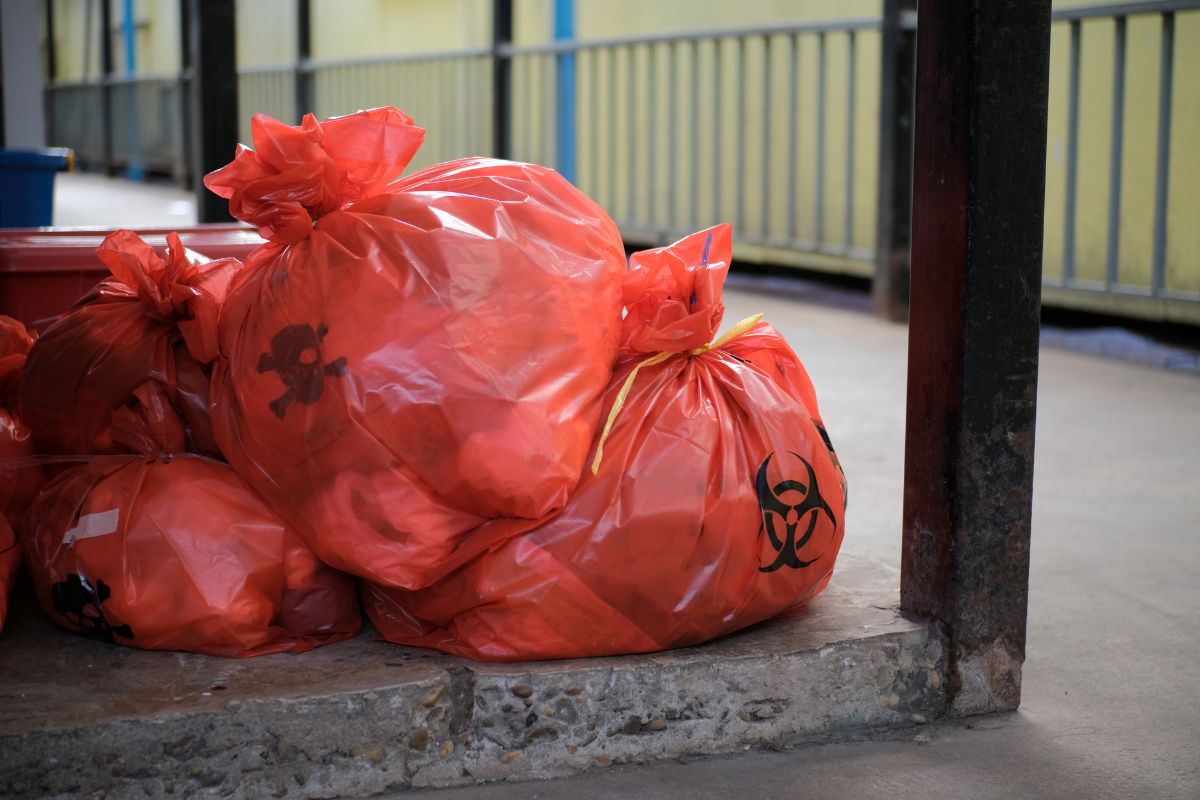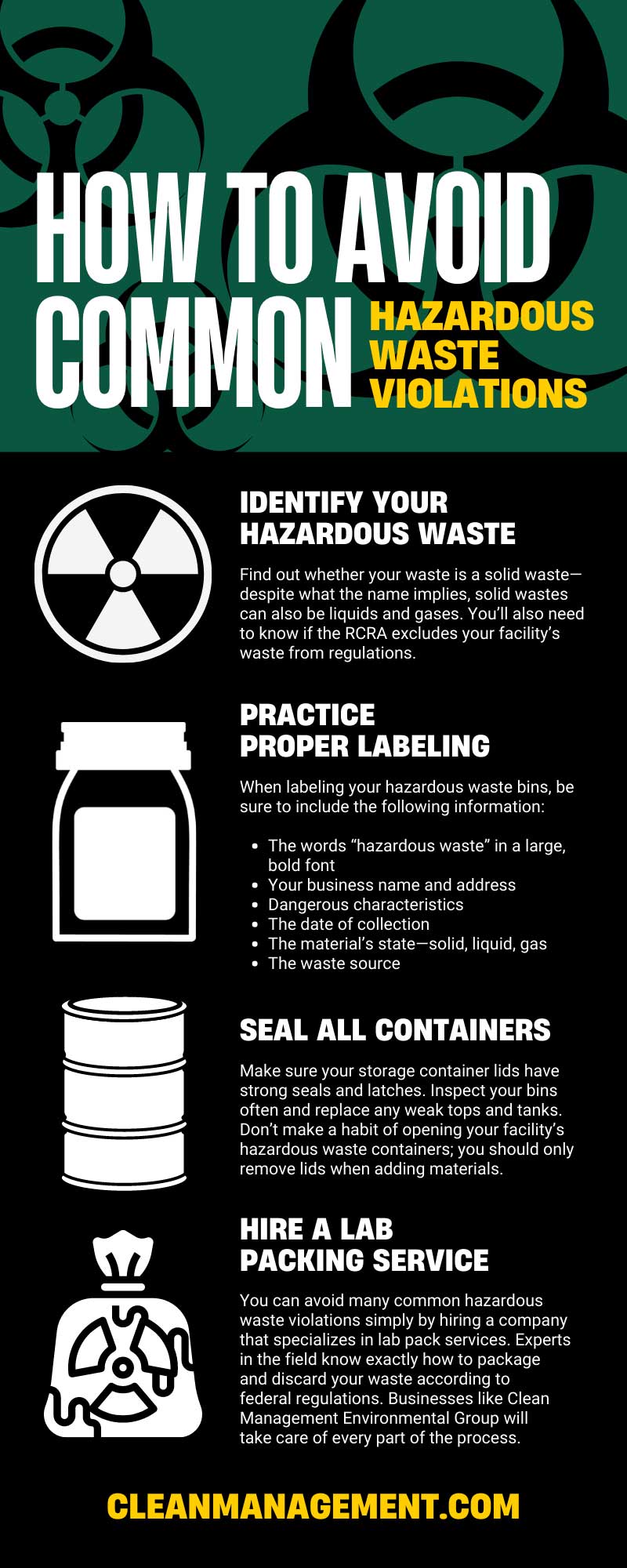How To Avoid Common Hazardous Waste Violations

Businesses can waste thousands of dollars in fines when they break laws regarding hazardous waste. The Environmental Protection Agency (EPA) is in charge of creating guidelines and punishing those who don’t meet required standards. Through the Resource Conservation and Recovery Act (RCRA), the EPA can control the hows, whens, and wheres of hazardous waste disposal.
Rule-breaking isn’t always due to ill intentions, and it can happen to companies of all sizes. Toxic waste laws are long and complex, making them very difficult to navigate. Use this guide to learn how to avoid common hazardous waste violations in your own practices.
Identify Your Hazardous Waste
Many facilities that generate hazardous waste don’t even know what they’re producing. Therefore, your business must perform waste determinations to identify your substances and categorize them correctly. Failure to do so creates uninformed employees and puts everyone in danger.
Find out whether your waste is a solid waste—despite what the name implies, solid wastes can also be liquids and gases. You’ll also need to know if the RCRA excludes your facility’s waste from regulations.
You must determine whether your company’s by-products have hazardous waste characteristics. The features to look for include:
- Ignitability
- Toxicity
- Reactivity
- Corrosivity
Practice Proper Labeling
Once you’ve identified your workplace’s hazardous waste, you need to label it appropriately; businesses get in a lot of trouble because of poor or non-existent labeling practices. Waste containers must communicate the substances they hold clearly to avoid unsafe handling.
When labeling your hazardous waste bins, be sure to include the following information:
- The words “hazardous waste” in a large, bold font
- Your business name and address
- Dangerous characteristics
- The date of collection
- The material’s state—solid, liquid, gas
- The waste source
Seal All Containers
Some hazardous waste generators leave their containers open for easy access. While it’s more convenient to do this, failure to close your bins can be a significant safety risk. You must thoroughly seal all of your containers to prevent spills and cross-contamination.
Make sure your storage container lids have strong seals and latches. Inspect your bins often and replace any weak tops and tanks. Don’t make a habit of opening your facility’s hazardous waste containers; you should only remove lids when adding materials.
Optimize Your Waste Storage Space
Your business’s storage area plays a huge role in maintaining proper hazardous waste practices. This space should be separate from regular workstations. Define this area clearly by using bold signage to keep unauthorized personnel out.
You can optimize this area by performing frequent inspections and improving your facility’s organization process. Some find it helpful to store bins in secondary containers to control leaks. Make sure all receptacles are in good condition and keep your storage area free of clutter and debris.
Hire a Lab Packing Service
You can avoid many common hazardous waste violations simply by hiring a company that specializes in lab pack services. Experts in the field know exactly how to package and discard your waste according to federal regulations. Businesses like Clean Management Environmental Group will take care of every part of the process.
Professional lab packing services will provide high-quality containers that can withstand the harshest materials. They’ll also take care of labeling, storage, and transportation. Your company’s liability doesn’t end just because you’ve outsourced the work, so make sure you choose a trustworthy business.
Your lab pack service provider can also help you identify your facility’s waste based on characteristics and sources. They’ll provide safe transportation and EPA-approved disposal, so you don’t incur hefty fines for unsafe dumping.
Keep a Hazardous Waste Manifest
Much of hazardous waste regulation comes down to paperwork. You must have adequate documentation of all your toxic materials and disposal processes; many businesses fill out their forms incorrectly or fail to keep any records at all.
Businesses that produce dangerous materials must have a hazardous waste manifest. The EPA created this documentation system to track waste from production to disposal. You are required to send these documents to the EPA and the US Department of Transportation to avoid consequences.
Don’t make these mistakes when filling out your transportation forms:
- Use incorrect waste codes
- Fail to verify information
- Date things wrong
- Provide inaccurate material information
Develop an Emergency Response Plan
The EPA isn’t the only government entity that cares about hazardous waste. The Occupational Safety and Health Administration (OSHA) has rules that protect employees who handle toxic substances. One of the most common infractions they see is the lack of an emergency response plan.
Many emergency processes are inadequate, irrelevant, or unclear to the people they are supposed to protect. You should have a running document that an authorized individual updates as things change around your location; posting current evacuation maps and clear procedure signs will help staff stay informed.
Your hazardous waste emergency plan means nothing if it doesn’t work in action. Simulate emergencies and practice drills so everyone knows how to respond. You should also designate a point of contact in each department to streamline communication.
Successful hazardous waste producers hire safety managers to handle all policies regarding harmful materials. It becomes this individual’s responsibility to understand the laws, enforce rules, and correct any problems. Your safety manager will be the best resource in case of a waste-related emergency.
Consult With Waste Disposal Specialists
People make mistakes when they try to take niche subject matters on themselves. If you aren’t part of the waste management industry, the likelihood of missing important details is high. The best way to avoid hazardous waste violations is to consult with waste disposal specialists.
Using professional lab packing services only solves part of the problem; industry experts can fill your information deficit so you don’t continue to make mistakes. They may also offer training programs to keep leadership and employees up-to-date with the latest waste management practices.
Avoid Hazardous Waste Violations With Clean Management Environmental Group
You don’t have to scour the earth to find reliable waste management services. Instead, hire Clean Management Environmental Group to handle all of your waste storage, transportation, and disposal needs. We don’t stop at lab packing; we also train businesses and offer cleanup services when things go awry.
Our vast network allows us to lend services anywhere in the United States. Use our website to request a quote, or call for more information. Stop wasting money and ruining your reputation on preventable hazardous waste infractions by contacting us today.

